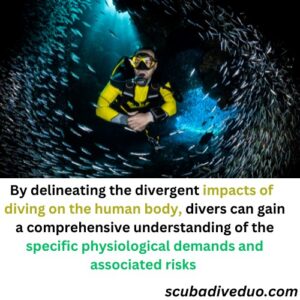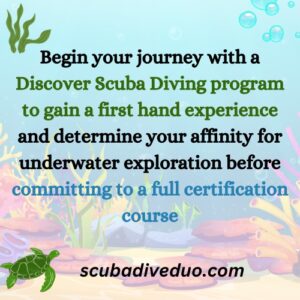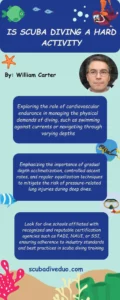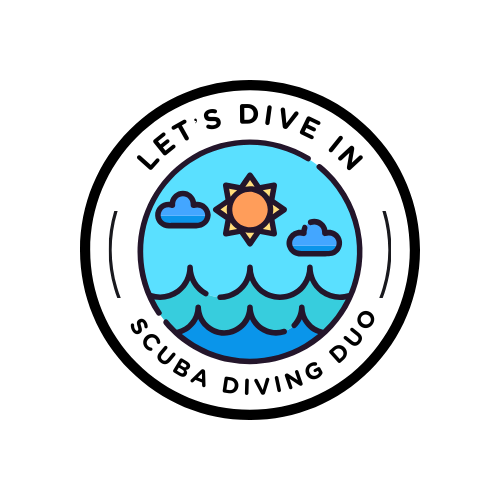Beneath the surface of the world’s oceans lies a mesmerizing realm that has captivated human curiosity for centuries. How Do Experts Decode the Enigma of Scuba Diving, Navigating Its accessibility with Remarkable Ease? Delve into the depths of scuba diving to unravel the mysteries of its challenges and the accessibility of scuba diving. Picture yourself, weightless and free, surrounded by the gentle sway of coral reefs, schools of tropical fish painting the waters with their vivid hues, and the enigmatic shadows of larger creatures weaving through the blue depths. Scuba diving isn’t just a sport; it’s an invitation to explore a world unseen, to immerse oneself in the wonders of an aquatic universe where gravity loses its grip and the ordinary boundaries of existence blur into the enigma of the deep blue.
Embarking on the journey to master the art of scuba diving is akin to unraveling a captivating mystery—one that demands a balance of skill, determination, and an unwavering passion for the underwater world. Join us as we navigate the intricate labyrinth of scuba diving, unraveling the multifaceted layers that dictate the ease or challenges one might encounter along this immersive expedition. Through a lens that balances aspiration with realism, let’s explore the depths of scuba diving and unravel the mysteries that surround its accessibility and mastery.

jump to a specific section
Factors Influencing the Difficulty of Learning to Scuba Dive
Learning to scuba dive isn’t just about acquiring the technical skills; it’s a holistic journey that hinges on several crucial factors. These elements play a pivotal role in determining the ease or difficulty one might encounter while delving into the depths of this mesmerizing aquatic adventure. Let’s delve into the key influencers that mold the experience of learning to scuba dive:
Personal Fitness Levels in Scuba Diving:
Embarking on the adventure of scuba diving demands a certain level of physical fitness to navigate the challenges of the underwater world seamlessly. The influence of personal fitness levels in scuba diving encompasses various aspects that are crucial for a safe and enjoyable experience. Let’s delve into the significance of physical fitness in the context of scuba diving:
- Cardiovascular Endurance and Respiratory Efficiency: Exploring the role of cardiovascular endurance in managing the physical demands of diving, such as swimming against currents or navigating through varying depths. Understanding the importance of efficient respiratory function in maintaining proper breathing rhythms and managing air consumption during prolonged dives.
- Muscular Strength and Endurance: Highlighting the significance of muscular strength in handling diving equipment, including tanks, weights, and other apparatus, particularly during entry and exit from the water. Emphasizing the role of muscular endurance in maintaining proper body positioning, buoyancy control, and managing the external pressures experienced at greater depths.
By comprehensively understanding the impact of personal fitness levels on scuba diving, enthusiasts can better prepare themselves to embrace the challenges of the underwater world while ensuring their safety and enjoyment throughout their diving endeavors.
Significance of Aquatic Comfort and Adaptability:
For aspiring divers, cultivating a sense of comfort and adaptability in aquatic environments is pivotal to truly enjoy and excel in the art of scuba diving. The ability to remain calm and composed underwater not only enhances the overall experience but also ensures safety and confidence during dives. Let’s delve into the importance of water comfort for aspiring divers:
- Overcoming Aquatic Anxiety: Understanding common fears and anxieties related to being submerged in water. Exploring effective techniques and training methods to overcome water-related apprehensions and build confidence.
- Adaptation to Underwater Environments: Highlighting the necessity of adapting to the sensory changes and unique challenges presented by the underwater world. Discussing strategies to acclimate to buoyancy adjustments, pressure differentials, and underwater navigation to foster a sense of ease and control.
By acknowledging the significance of water comfort and adeptness in aquatic environments, aspiring divers can develop the necessary psychological resilience and adaptability to fully immerse themselves in the mesmerizing world beneath the surface, enabling a more fulfilling and enriching scuba diving experience.
Role of Swimming Proficiency in Scuba Diving:
Proficiency in swimming serves as a fundamental prerequisite for aspiring scuba divers, as it forms the basis for maneuvering gracefully and effectively in the underwater realm. The ability to navigate through water with ease and confidence lays the groundwork for a safe and enjoyable scuba diving experience. Let’s delve into the pivotal role of swimming proficiency in the context of scuba diving:
- Water Confidence and Control: Emphasizing the importance of water confidence in maintaining composure and control while submerged. Exploring the connection between water familiarity, body positioning, and efficient propulsion techniques to facilitate smooth underwater movements.
- Buoyancy Management and Navigation: Discussing the impact of swimming skills on achieving optimal buoyancy control and maintaining proper depth during dives. Highlighting the significance of directional navigation and effective finning techniques to conserve energy and enhance the overall diving experience.
By acknowledging the vital role of swimming proficiency in scuba diving, aspiring enthusiasts can prioritize the development of essential aquatic skills, fostering a strong foundation for a seamless and gratifying journey into the depths of the ocean’s mesmerizing wonders.

The Ease of Scuba Diving for Beginners
Contrary to popular belief, scuba diving unveils itself as a surprisingly accessible and enriching experience for beginners, offering a seamless transition into the captivating world beneath the ocean’s surface. Delving into the core elements of scuba diving, it becomes evident that the initial stages of learning are structured to accommodate enthusiasts with varying levels of experience. Let’s explore the aspects that contribute to the ease of scuba diving for beginners:
Basic Skills Involved in Scuba Diving:
Mastery of basic scuba diving skills forms the cornerstone of a fulfilling and safe underwater adventure. These essential techniques, while simple in nature, lay the groundwork for a seamless and enjoyable diving experience. Let’s delve into the fundamental skills that aspiring divers must acquaint themselves with:
- Equipment Familiarization and Usage: Understanding the functionalities of scuba gear, including the mask, fins, regulator, and buoyancy control device (BCD), to ensure proficient and confident operation underwater. Emphasizing the significance of equipment checks and safety protocols before and during dives to mitigate potential risks and ensure a smooth diving experience.
- Breathing Techniques and Buoyancy Control: Introducing effective breathing methods, such as slow and deep breaths, to optimize air consumption and maintain a relaxed and controlled breathing pattern throughout the dive. Highlighting the importance of buoyancy control through proper weight distribution and adjustments, enabling divers to achieve neutral buoyancy and effortless movement underwater.
- Underwater Communication and Buddy System: Communicating effectively with dive partners through standardized hand signals and gestures to ensure seamless coordination and safety during the dive. Reinforcing the significance of the buddy system in enhancing safety measures and facilitating mutual assistance in case of emergencies or unforeseen circumstances during the dive.
By mastering these basic skills, aspiring divers can establish a strong foundation for their scuba diving journey, fostering confidence and proficiency that pave the way for more advanced exploration and enjoyment of the mesmerizing underwater world.
Addressing Misconceptions about Complexity:
Dispelling the notion of scuba diving as a daunting and complex pursuit is essential in encouraging beginners to embrace the sport with confidence and enthusiasm. By addressing common misconceptions about the intricacies of scuba concepts and safety procedures, we can foster a more inclusive and welcoming environment for novice divers. Let’s unravel these misunderstandings and provide clarity on the accessibility and practicality of scuba diving:
- Simplifying Scuba Concepts: Breaking down technical jargon and intricate concepts into digestible and relatable terms, fostering a comprehensive understanding of diving principles for enthusiasts with varying levels of familiarity. Emphasizing the structured and intuitive nature of scuba training programs, designed to progressively introduce and reinforce key concepts, ensuring a gradual and seamless learning experience.
- Highlighting Safety Measures and Protocols: Shedding light on the stringent safety standards and protocols integrated into scuba diving training, emphasizing their practical application in real-life diving scenarios to ensure a secure and controlled diving environment. Showcasing the effectiveness of pre-dive safety checks and thorough briefings in preventing potential risks and fostering a culture of preparedness and vigilance among divers.
By debunking these misconceptions, we aim to create a more inclusive and accessible narrative surrounding scuba diving, fostering a supportive and nurturing environment that encourages beginners to embark on their diving journey with a sense of excitement and assurance.
Emphasizing the Accessibility of Scuba Diving as a Recreational Pastime:
Scuba diving, often perceived as an exclusive and niche pursuit, is, in reality, a highly accessible and enriching recreational activity that beckons enthusiasts from all walks of life. Highlighting the inclusive nature of scuba diving fosters a sense of community and camaraderie among divers, encouraging individuals to explore the underwater world with confidence and enthusiasm. Let’s shed light on the accessibility of scuba diving as a recreational pastime:
- Diverse Training Programs for All Skill Levels: a. Showcasing the availability of comprehensive and tailored training programs catering to individuals with varying levels of experience and expertise, fostering an inclusive environment that nurtures skill development and confidence building. Highlighting the flexibility of training schedules and the abundance of beginner-friendly diving courses designed to accommodate the learning needs and preferences of diverse diving enthusiasts.
- Community Engagement and Support: Illustrating the vibrant and welcoming community of divers, characterized by mutual support, shared experiences, and a passion for exploring the wonders of the underwater world, fostering a sense of belonging and camaraderie among divers of all backgrounds. Showcasing the accessibility of local diving clubs, events, and initiatives that encourage participation and interaction among diving enthusiasts, fostering a dynamic and engaging platform for knowledge exchange and skill enhancement.
By emphasizing the accessible and inclusive nature of scuba diving as a recreational pastime, we aim to inspire a broader audience to embrace this enthralling aquatic pursuit, fostering a community of passionate and dedicated divers united by their shared love for the mesmerizing beauty of the ocean.
Safety Considerations and Long-Term Effects
While scuba diving offers an unparalleled opportunity to explore the ocean’s wonders, it’s crucial to understand the importance of adhering to safety protocols and recognizing potential long-term effects, especially for those venturing into deep or commercial diving. Delving into the critical aspects of safety, we shed light on the long-term impact of prolonged diving. Let’s navigate the waters of safety considerations and potential long-term effects:
Differentiation between Recreational and Commercial/Deep Diving Impact:
Understanding the distinct nature of recreational and commercial/deep diving is crucial in assessing the potential bodily impact and long-term implications associated with each type of diving activity. By highlighting the key differentiators, we shed light on the specific physiological considerations and risks that divers should be mindful of. Let’s delve into the contrasting impacts of recreational and commercial/deep diving on the human body:
- Recreational Diving Impact: Detailing the moderate physiological impact of recreational diving within recommended depth and time limits, emphasizing the importance of adherence to established safety guidelines for a secure and enjoyable diving experience. Highlighting the significance of routine safety checks, equipment maintenance, and dive planning to mitigate potential risks and ensure optimal physical well-being during recreational dives.
- Commercial and Deep Diving Impact: Outlining the heightened physiological stress and potential risks associated with extended exposure to greater depths and prolonged dive durations in commercial and deep diving scenarios. Discussing the increased pressure differentials, potential nitrogen narcosis, and other physiological challenges that demand comprehensive training, meticulous planning, and stringent safety protocols to safeguard diver health and well-being.
By delineating the divergent impacts of recreational and commercial/deep diving on the human body, divers can gain a comprehensive understanding of the specific physiological demands and risks associated with different diving contexts, enabling informed decision-making and a proactive approach to safety and well-being during their diving endeavors.

Safety Guidelines and Importance of Diving with a Buddy:
Enforcing stringent safety guidelines and prioritizing the buddy system are pivotal in ensuring a secure and enriching accessibility of scuba diving experience. By underscoring the significance of adhering to established safety protocols and fostering collaborative diving practices, we promote a culture of preparedness and mutual assistance among divers. Let’s delve into the key safety guidelines and the importance of the buddy system in scuba diving:
- Adherence to Safety Protocols: Highlighting the importance of pre-dive safety checks, including equipment assessments, air supply evaluations, and dive plan reviews, to preemptively identify and address potential risks or issues. Stressing the significance of maintaining situational awareness, practicing controlled descents/ascent rates, and monitoring air consumption levels to ensure optimal safety and prevent diving-related accidents or emergencies.
- Role of the Buddy System: Emphasizing the essential role of the buddy system in enhancing diving safety, fostering effective communication, and providing mutual assistance in case of equipment malfunctions, disorientation, or emergencies during the dive. Encouraging divers to establish clear and standardized underwater communication signals, foster trust and reliability with their dive partners, and maintain close proximity for continuous monitoring and support throughout the diving experience.
By advocating for the adherence to comprehensive safety guidelines and promoting the active engagement of the buddy system, divers can cultivate a robust safety culture that prioritizes preparedness, vigilance, and collaborative support, fostering a secure and enjoyable scuba diving experience and its accessibility for all enthusiasts.
Potential Long-Term Effects of Deep Diving on the Respiratory System:
While the allure of deep diving beckons with promises of uncovering underwater mysteries, it’s essential to be aware of the potential long-term impacts that extended deep diving may pose to the respiratory system, particularly the lungs and small airways. By shedding light on these potential effects, divers can take a proactive approach to safeguard their respiratory health. Let’s explore the potential long-term effects of deep diving on the lungs and small airways:
- Pressure-Related Lung Effects: Discussing the implications of increased pressure differentials at significant depths, including the potential for barotrauma and the development of conditions such as pulmonary over inflation and pneumothorax. Emphasizing the importance of gradual depth acclimatization, controlled ascent rates, and regular equalization techniques to mitigate the risk of pressure-related lung injuries during deep dives.
- Gas Absorption and Decompression Sickness: Highlighting the risk of gas absorption in the lungs during deep dives, leading to the development of decompression sickness and related respiratory symptoms, such as dyspnea and coughing. Advocating for the strict adherence to decompression tables, safety stops, and recommended ascent profiles to minimize the potential for decompression sickness and its associated respiratory complications.
By illuminating the potential long-term effects of deep diving on the respiratory system, divers can prioritize their health and well-being, ensuring a cautious and informed approach to deep diving activities that safeguards their lungs and small airways from potential risks and complications.
Overcoming Challenges and Anxieties in Scuba Diving
Embarking on the journey of accessibility of scuba diving often entails navigating through various challenges and anxieties that can potentially hinder the overall experience. By addressing these obstacles and providing effective strategies for coping and overcoming them, we aim to empower divers to approach their underwater adventures with confidence and resilience. Let’s delve into the common challenges and anxieties faced by divers and explore strategies for conquering them:
Common Challenges Faced by Novice Divers During Training:
For novice divers, the journey of scuba diving training often presents a set of common challenges that can impact their learning and overall experience. Understanding these challenges and implementing effective strategies to address them is crucial in ensuring a smooth and fulfilling training process. Let’s delve into the common hurdles faced by novice divers during training and explore ways to overcome them:
- Mastering Underwater Skills: Addressing the difficulties associated with mastering essential underwater skills, such as buoyancy control, mask clearing, and regulator recovery, and providing comprehensive guidance and practice tips to enhance skill proficiency. Emphasizing the importance of patience, consistent practice, and open communication with instructors to build confidence and competence in executing fundamental diving techniques.
- Adapting to Underwater Environments: Acknowledging the challenges related to acclimatizing to the sensory changes and unfamiliar surroundings of underwater environments, including visibility variations and aquatic life encounters, and offering techniques for gradual adaptation and comfort-building. Introducing controlled exposure to different diving conditions, simulated training scenarios, and gradual depth progression to facilitate a smooth transition into diverse underwater settings and foster a sense of ease and control.
- Overcoming Performance Pressure: Recognizing the impact of performance pressure and self-expectations on novice divers, including the fear of making mistakes or underperforming during training sessions, and advocating for a supportive learning environment that encourages experimentation and learning from experiences. Promoting a growth mindset, positive reinforcement, and a focus on personal progress rather than perfection to alleviate performance-related anxieties and foster a resilient and confident approach to scuba diving training.
By addressing these common challenges and providing effective strategies for novice divers, we aim to facilitate a positive and enriching training experience that builds a strong foundation of skills, confidence, and adaptability, paving the way for a successful and enjoyable scuba diving journey.
Emphasizing the Importance of Perseverance and Support:
In the face of challenges and obstacles, the significance of perseverance and a robust support system cannot be overstated, especially for novice divers navigating through the intricacies of scuba diving training. Highlighting the transformative power of perseverance and a nurturing support network, we aim to inspire divers to stay resilient and motivated in their pursuit of mastering the art of scuba diving. Let’s explore the crucial role of perseverance and support in overcoming difficulties during scuba diving training:
- Cultivating Resilience: Stressing the value of persistence and determination in the face of setbacks and initial learning hurdles, fostering a resilient mindset that encourages divers to view challenges as opportunities for growth and skill development. Encouraging divers to set realistic goals, track their progress, and celebrate their achievements, nurturing a sense of accomplishment and confidence that fuels their perseverance and commitment to mastering diving skills.
- Building a Supportive Community: Promoting the importance of a supportive diving community, characterized by experienced mentors, understanding peers, and knowledgeable instructors, who offer guidance, encouragement, and constructive feedback throughout the training journey. Advocating for active participation in diving clubs, forums, and local communities to foster connections, share experiences, and seek valuable insights that foster a sense of belonging and camaraderie among divers with shared passions and aspirations.
- Seeking Guidance and Mentorship: Encouraging novice divers to actively seek guidance and mentorship from experienced professionals and instructors, leveraging their expertise and insights to gain valuable perspectives and refine their diving techniques. Highlighting the significance of open communication, constructive feedback, and personalized guidance in addressing specific challenges and areas for improvement, nurturing a supportive learning environment that fosters continuous skill enhancement and personal growth.
By underscoring the pivotal role of perseverance and support in the scuba diving training journey, we aim to empower divers to confront difficulties with resilience, determination, and a strong network of mentors and peers, fostering an environment that nurtures continuous learning, growth, and achievement in the captivating world of scuba diving.
Tips for Aspiring Scuba Divers
For those setting out on the exhilarating journey of scuba diving, arming oneself with practical tips and insights can greatly enhance the overall diving experience and pave the way for a seamless and enjoyable underwater adventure. Offering guidance and advice to aspiring divers ensures a solid foundation and fosters a sense of preparedness for the exciting challenges that lie ahead. Let’s delve into a comprehensive set of tips curated for aspiring scuba divers:
Practical Advice for Individuals Considering Scuba Diving as a Hobby
For those contemplating scuba diving as a newfound hobby, practical advice and proactive guidance can pave the way for a rewarding and enriching exploration of the underwater realm. Providing valuable insights and considerations and accessibility of scuba diving, this advice serves as a compass for individuals venturing into the captivating world of scuba diving. Here are some practical tips for those considering scuba diving as a hobby:
- Initiate with Discover Scuba Diving:
- Begin your journey with a Discover Scuba Diving program to gain a firsthand experience and determine your affinity for underwater exploration before committing to a full certification course.
- Invest in Professional Training:
- Enroll in a reputable and certified scuba diving training program, led by experienced instructors, to acquire essential skills, knowledge, and safety protocols crucial for a secure and enjoyable diving experience.
- Rent Equipment Initially:
- Opt for equipment rental during your initial diving phases to familiarize yourself with various gear types and configurations before investing in personal diving equipment that aligns with your preferences and comfort level.
- Choose Diving Destinations Wisely:
- Select beginner-friendly diving destinations renowned for their clear waters, moderate currents, and diverse marine life, ensuring a relaxed and immersive diving experience conducive to skill development and confidence building.
- Prioritize Diving within Limits:
- Adhere to recommended depth and time limits during dives, allowing for gradual progression as you build expertise and familiarity with different diving environments, thus minimizing potential risks and enhancing overall safety.
- Cultivate Environmental Awareness:
- Educate yourself on local marine ecosystems, conservation efforts, and sustainable diving practices to foster an eco-conscious approach that respects and preserves the delicate balance of underwater environments for future generations.
- Engage in Continuous Learning:
- Embrace a lifelong learning mindset by participating in specialty courses, workshops, and skill enhancement programs that deepen your understanding of specific diving aspects and expand your horizons within the realm of scuba diving.
By heeding these practical pieces of advice, individuals can embark on their scuba diving journey with confidence, mindfulness, and a profound appreciation for the wonders of the underwater world, fostering a lifelong passion for exploration, conservation, and connection with nature’s mesmerizing aquatic wonders.

Recommendations for Finding Reputable Dive Schools and Instructors
Selecting a reputable dive school and instructor is pivotal in laying the foundation for a safe and enriching scuba diving journey. With a multitude of options available, it is essential to consider certain factors to ensure the credibility, expertise, and quality of the chosen diving institution and instructors. Here are some key recommendations for finding reputable dive schools and instructors:
- Research Accredited Certification Agencies:
- Look for dive schools affiliated with recognized and reputable certification agencies such as PADI, NAUI, or SSI, ensuring adherence to industry standards and best practices in scuba diving training.
- Check Instructor Qualifications and Experience:
- Verify the credentials, certifications, and teaching experience of the dive instructors associated with the school, emphasizing the importance of seasoned professionals with a track record of providing comprehensive and safe diving instruction.
- Assess Student Reviews and Testimonials:
- Evaluate the feedback and testimonials from former students to gain insights into the overall training experience, instructor-student dynamics, and the school’s commitment to safety, professionalism, and personalized guidance.
- Visit the Diving Facility and Equipment:
- Take a tour of the diving facility to assess the condition of the training equipment, the maintenance standards, and the overall facility ambiance, ensuring a conducive and well-equipped learning environment that prioritizes student safety and comfort.
- Inquire about Safety Protocols and Emergency Procedures:
- Engage in open discussions with the dive school staff regarding their safety protocols, emergency response procedures, and contingency plans, ensuring a proactive approach to minimizing risks and ensuring a secure diving experience for all students.
- Seek Recommendations from Diving Communities:
- Reach out to local diving communities, forums, and experienced divers to seek recommendations and firsthand insights into the reputable dive schools and instructors known for their commitment to excellence, safety, and fostering a supportive learning environment.
- Evaluate Course Curriculum and Specializations:
- Review the dive school’s course curriculum, specialized training offerings, and additional skill development programs to ensure a comprehensive and tailored learning experience that aligns with your diving goals, interests, and proficiency levels.
By following these recommendations, aspiring divers can make informed and discerning decisions when selecting a reputable dive school and instructor, setting the stage for a fulfilling and secure scuba diving education that instills confidence, proficiency, and a deep appreciation for the wonders of the underwater world.
Encouraging a Proactive Approach to Training and Skill Development
Approaching scuba diving with a proactive and dedicated mindset is instrumental in fostering continuous growth, confidence, and proficiency in the realm of underwater exploration. By embracing a proactive approach to training and skill development, divers can unlock a world of opportunities for personal advancement and a deeper understanding of the intricacies of scuba diving. Here are some key strategies for fostering a proactive approach to training and skill development in scuba diving:
- Set Clear Learning Goals:
- Define specific learning objectives and milestones, outlining the skills and knowledge areas you aim to master during each phase of your scuba diving training, fostering a structured and purpose-driven learning journey.
- Engage in Regular Practice:
- Dedicate regular time for skill practice and refinement, both in controlled pool environments and open-water settings, fostering muscle memory, confidence, and adaptability in executing fundamental and advanced diving techniques.
- Participate in Specialty Courses:
- Explore diverse specialty courses and training programs, such as underwater photography, wreck diving, or deep diving, to broaden your skill set, deepen your understanding of specific diving aspects, and expand your horizons within the realm of scuba diving.
- Seek Constructive Feedback:
- Actively solicit constructive feedback from instructors, mentors, and experienced divers, valuing their insights and recommendations for areas of improvement, fostering a continuous learning mindset and a commitment to refining your diving proficiency.
- Foster Physical and Mental Fitness:
- Incorporate a holistic approach to fitness and well-being, including regular exercise, proper nutrition, and mindfulness practices, fostering optimal physical stamina, mental clarity, and emotional resilience that are crucial for navigating challenging diving environments.
- Stay Abreast of Industry Developments:
- Keep yourself updated on the latest industry trends, technological advancements in diving equipment, and evolving safety standards, fostering a proactive approach to embracing innovation, best practices, and emerging opportunities for skill enhancement and personal growth.
- Share Knowledge and Experiences:
- Actively engage in knowledge sharing with fellow divers, community members, and newcomers to the diving scene, fostering a culture of collaboration, mentorship, and camaraderie that enriches the collective learning experience and promotes a supportive diving ecosystem.
By embracing these proactive strategies, divers can cultivate a dynamic and resilient approach to training and skill development, fostering a rewarding and transformative journey that transcends the boundaries of conventional scuba diving, and propels them towards greater depths of expertise and exploration in the captivating world beneath the waves.
Conclusion
Scuba diving, with its allure of exploring the mesmerizing underwater world, presents a unique blend of challenges, excitement, and fulfillment. Through this comprehensive exploration of the intricacies and considerations surrounding scuba diving, it becomes evident that while the initial steps may seem daunting, with the right approach and guidance, anyone can master the art of diving. Whether it is understanding the importance of physical fitness, the necessity of adhering to safety protocols, or the significance of building a supportive diving community, the journey of scuba diving is enriched by a proactive mindset, perseverance, and a profound respect for the marine environment.
Key Takeaways: Ease and Accessibility of Scuba Diving
Scuba diving, despite its initial perceived complexities, emerges as an accessible and fulfilling activity with the following key takeaways:
- Accessibility: Scuba diving is accessible to individuals of varying fitness levels, swimming abilities, and comfort levels in water, emphasizing its inclusivity as a recreational pursuit for all.
- Learning Curve: While some challenges may arise during the learning process, scuba diving is deemed relatively easy to grasp, with a focus on fundamental skills such as buoyancy control, breathing, and equipment management.
- Safety Measures: Emphasizing the importance of adhering to safety protocols and diving with a buddy, scuba diving is regarded as a safe and enjoyable activity when proper guidelines are followed.
- Overcoming Anxieties: Novice divers can overcome anxieties through perseverance, support from the diving community, and the cultivation of a positive mindset, enabling them to conquer challenges and fully embrace the underwater experience.
- Long-Term Impact: While deep and commercial diving may pose certain long-term respiratory risks, recreational diving within recommended limits is considered safe for the majority of divers, underscoring the importance of responsible diving practices.
- Holistic Experience: Scuba diving not only offers the opportunity to explore the ocean’s breathtaking wonders but also encourages environmental awareness and conservation efforts, fostering a deeper connection with marine ecosystems and the need to preserve them for future generations.
In essence, the world of scuba diving beckons with open arms, inviting enthusiasts to embark on an enriching journey that transcends boundaries, fosters personal growth, and instills a profound sense of wonder and respect for the captivating mysteries that lie beneath the ocean’s surface.
Embrace the Adventure of Scuba Diving: Dive into the Beauty Beneath
As you embark on the enchanting voyage of scuba diving, let the allure of the underwater world ignite your spirit of exploration and wonder. With the right guidance and preparation, you can unlock the gateway to a realm teeming with vibrant marine life, captivating seascapes, and awe-inspiring encounters that will leave an indelible mark on your soul.
Equip yourself with the necessary skills, knowledge, and support, and venture into the depths with confidence and respect for the ocean’s magnificence. Embrace the thrill of mastering buoyancy, the serenity of gliding through azure waters, and the exhilaration of discovering hidden underwater treasures.
Remember, the journey of scuba diving is not merely about diving into the depths; it’s about delving into a world of endless possibilities, where every dive unravels a new chapter of enchantment and enlightenment. Embrace the adventure, savor the beauty, and let the ocean’s magic unfold before your very eyes. The underwater world awaits your exploration – are you ready to take the plunge?

Encouraging message for prospective divers
To all prospective divers on the cusp of an extraordinary journey, let the call of the ocean be your guide, beckoning you to embark on an enriching voyage of discovery and wonder. With every dive, embrace the unknown with courage, curiosity, and a deep sense of respect for the ocean’s boundless majesty. Let the rhythmic dance of marine life and the kaleidoscope of underwater hues ignite your passion for exploration, forging an unbreakable bond with the underwater world.
As you take that first plunge, remember that you are not merely delving into the depths but also into a world of endless fascination and profound connections. With each dive, you’ll unveil the secrets of the ocean, unraveling its mysteries one stroke at a time. Let the serenity of weightlessness and the magnificence of aquatic life fill your soul with a sense of belonging and harmony.
So, heed the call of the sea, equip yourself with knowledge, training, and a spirit of adventure, and dive into this enchanting realm with confidence. Embrace the ocean’s embrace, for it holds within its depths a wealth of experiences and memories that will enrich your life forever. Let the journey begin, and may your diving adventures be as boundless as the ocean itself.
